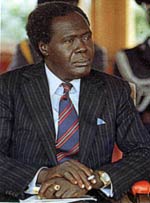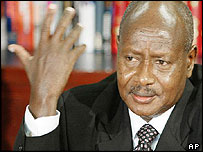by Winfred Mwebe
"The Ugandan public is convinced an individual’s blood is checked to find the ‘virus’ in the body -‘ moving up and down’ - the insect or the bug as they term it in local dialects."
Last month I was in Uganda for 4 weeks. I was very happy to see my family after ten years without seeing them. I had fun and felt the warmth of a big family. But after a few days of good food and warm welcome I had to face reality.
I saw how people have lost hope, how people neglect their own lives. Everyone has ‘AIDS’ in Uganda. The poor say: "What can we do?… the virus is killing us!" The poor are not expected to live; the rich are expected to live as they are thought to be sent to America and Europe to remove their blood every other month. On the other hand, while the poor widows have no hope, the rich ones get on with their lives and find new partners as soon as their husbands or partners die. These rich widows are not dying and everyone knows that rich widows do not die. It has reached the extent of identifying ‘AIDS’ with certain parts of the country. Once certain places are mentioned then people say that such an area is an ‘AIDS’ zone, and in most cases these places are slums.
What I saw in Uganda with my own eyes was a loss of hope. People roam the streets looking for something to do but nothing is there for them. I saw people on the streets looking very hungry and unable even to afford to drink at least two glasses of water a day. Malnutrition is rampant and this is not taken seriously as the few who understand how it can be fatal, are protecting themselves well And do not care much. Those who care are powerless to make a change and are never listened to when they try.
By the time I left the UK, the government here was complaining Of the overuse and dangers of antibiotics. Well, if anyone wants to Know what antibiotic overuse is about, then Uganda is the best place for this. Every corner shop has antibiotics and most of the Shopkeepers do not even know the brand names of the medicines They are selling. They just sell them as ‘double colour’ because the capsules normally have two colours. They are very cheap and by Ugandans most of them are thought to be fake.
Antibiotic overuse in Uganda has been going on for a long time and it gets worse and worse, year after year. To my surprise antibiotics are causing more harm than good as anyone can get them freely on self-diagnosis. The inability of Ugandans to afford private doctors or hospitals has caused them to resort to desperate measures, especially medication. As there is no free or even cheap medication, people have no choice but to use a cocktail of capsules hoping to get better without considering the dangers or side-effects these antibiotics can bring to the health and immune system.
After prolonged use of antibiotics, people develop persistent coughs, malaria and several other tropical illnesses that have been known for centuries. The difference is that now on the eve of the millennium, these illnesses are called ‘HIV’-related!
In Uganda ‘HIV’ and ‘AIDS’ interpretation is very different from how it is known here in the West. Ugandans kept asking me, "Are white people also dying as we are?" My response of course was "NO!" People could not believe me because they have no idea that they are being classed as a ‘high risk group’; neither do they know that malnutrition kills more people than so-called ‘AIDS’, nor do they have any knowledge on how stress-related illnesses are increasing because of rural-urban migration. Those who leave their villages for the city soon find that there is nothing to do or even eat. Ugandans take material things more importantly than their health and lives.
The big ‘AIDS’ industry in Uganda is busy telling the world how Ugandans are dying of ‘AIDS’ and money continues to be pumped into condom industries, raising ‘HIV/AIDS’ awareness programmes etc. However, no-one puts money into advising people on healthy eating/nutrition or hygiene - without forgetting poverty. We all know poverty kills. What about advising Ugandans of the dangers of antibiotics, or getting rid of them on the open market? Fake doctors in Uganda do business like fish and chips sellers because being a doctor has proved very commercially rewarding in the era of ‘AIDS’.
If you are not rich in Uganda, you are destined to die. There is no medication in hospitals and one wonders what has happened to our hospitals, our National Health Education and the state dispensaries. I feel sick because every time I hear about only one thing: ‘AIDS’ - yet we all know that there are more dangerous diseases in tropical countries such as Uganda. Only if those diseases can be properly treated would they evidently reduce the number of reported ‘AIDS’ cases.
We should not disguise the failure of Uganda’s Health Education, the lack of medications in hospitals, and above all corruption within the Health Ministry that wants to insist on ‘AIDS’ programmes because they are commercially beneficial especially from the Western World’s perspective. It is pathetic! My hope is that once these problems are looked into, many lives can be saved, so the ‘Pearl of Africa’ as Churchill once named this beautiful country, can flourish.
In a country like Uganda, ‘AIDS’ is not a genuine issue. What is more important is who has power. Genuine doctors are fighting each other instead of fighting to save lives. Take the example of Ugandan Professor Ssali in Kampala who has an interest in ‘HIV/AIDS’ and a specialist clinic. Instead of being helped by the government, he is being threatened by the Ugandan Medical Board not to ‘interfere’. Is this really working for the interest of Ugandan people, or for political interests. ‘AIDS’ becomes not a health debate but rather a political and financial one.
No-one is going to solve Uganda’s medical blunders better than Ugandans themselves. Instead of making money from the ‘AIDS’ industry, people’s lives should come first. Pharmaceutical companies, like Glaxo-Wellcome, are interested only in making money from the Ugandan government and some concerned organizations like WHO, Red Cross, etc.
Condom ‘awareness’ is considered a priority in Uganda. The condoms can even be distributed by companies freely in communities. Nowadays in Uganda people talk about condoms as some sort of fashion for the 90s. The hypocrisy is that no-one can get even free chroloquine tablets once they are down with malaria. Malaria kills in hours or days but ‘AIDS’ can take even ‘30 years’ to kill. In a country like Uganda, where 80% of the population lives under the poverty line without the basic necessities of life, expect to be save by a condom? These people do not have food to eat - what quality of life would a condom add? The Health Authorities talk about condoms to impress the public.
How come sex in Uganda is taboo while in the Western World sex is fun and people still enjoy it as ‘normally’ as they have always done? The West has judged that only the Sub-Saharan, the Gay community, IV drug users, haemophiliacs and those who have just visited Africa are the high-risk groups.
To my surprise most Ugandans are not aware of these risk group classifications of ‘HIV/AIDS’ strategy induced by the Western politics of policy makers. Ugandans still think that anyone can ‘catch it’ as shown in misleading advertisements against the ‘killer virus’. The way the ‘HIV’ test works is not explained to people. The public is convinced an individual’s blood is checked to find the ‘virus’ in the body - ‘moving up and down’ (the insect or the bug as they term it in local dialects). They have no clue that the ‘HIV’ test is an antibody test, and non-specific.
To my knowledge antibodies are usually a sign of health and functioning defence in the body. Antibodies show that the body can respond to infections. What makes ‘HIV’ antibodies different from other antibodies? Well, no one seems to know the answer to this. I was stunned to hear a Ugandan doctor explain to a patient that the test for antibodies is done only in African countries. He continued to explain that in the West, Europe and America, where technology is highly advanced, there are machines that see the ‘virus’ itself ‘doing the job’. At this point I interfered saying it was not true and antibody testing is used also in the West although this so-called ‘virus’ has never been purified and isolated .
The ‘AIDS’ acronym - Acquired Immune Deficiency Syndrome –can be describe many things like malnutrition, malaria, stress, TB, post-war related illness. The issue however remains in ‘high-risk’ categories that are ‘destined’ to die of ‘AIDS’ by all means whether by ‘acquiring it’ or being defined as having it. Research carried out in 1994 by King College Hospital here in London found that losing a spouse undermines the immune system and leaves a person prone to illnesses. But, in Sub-Saharan Africa, this cannot be the case and cannot be looked into because it is always politically correct to blame those who cannot defend themselves. In the Ugandan context losing a partner can be so cruel, and no-one can escape the stigma, unless of course you are rich and by finding a new partner can reduce the stress imposed on you by the community in general.
The most worrying question every Ugandan person asks is about people dying in couples. They cannot possibly relate it to stress so it is assumed to be ‘AIDS’. The next is that the children die too. This time it is not because of ‘AIDS’ but because of loneliness and the inability to cope alone with the pressures of life without guidance. All these people wait for their turns, and so they start dying early. People die mentally first, then their physical health also detoriates. Fear, isolation, loneliness, and above all lack of survival income leads to death. The usual conclusion is ‘death by AIDS’ - certainly no-one in these conditions dies with a healthy looking body.
Ugandans living in the UK who are aware of the nasty side effects and the toxicity of the ‘AIDS’ drugs that are still on trial here, do not use them themselves - they get them from their doctors and send them to Uganda for commercial interests. It is very sad to see that such a practice going on. How can one know of something so bad for them and then go on to make money out of it - especially when it can be fatal? While I was in Uganda so many people came to me asking for new ‘wonder drugs’ stating that in Europe and America there is ‘a cure’ already. I tried to explain that there is no such thing as a cure for ‘AIDS’. I told them that the combination therapies have been on trial for ages and that Ugandans are still used as guinea pigs. The only people who are doing well with the ‘HIV’ diagnosis are those who have decided to take control of their lives and not to listen to the myth that HIV=AIDS=DEATH. They get normal treatment for any symptoms they get, look after themselves sensibly, eat a balanced diet, opt for alternative treatment if need be and in most cases go back to the natural healing process that will not damage their bodies. These people have left their immune systems to return to normal with a positive mind.
While some ‘HIV/AIDS’ wards are scaling down in the UK the same type of centres are opening up in Uganda - and are becoming a booming business exploiting rich upper class families. instead of using a new hospital for humane purposes, the hospital is being built ‘apparently to offer subsidised prices’ for ‘AIDS’ treatment. No one needs to be a professor of medicine to realise that there is more to the marketing of ‘AIDS’ than just the hypothesis itself. Well, ladies and gentlemen, get up and join in the fight! Do not let capitalists extend their money-making schemes at the cost of human life.








